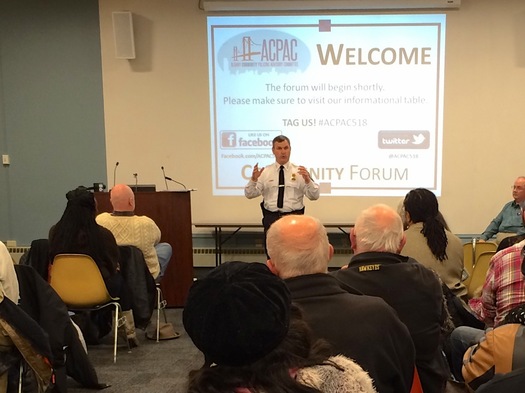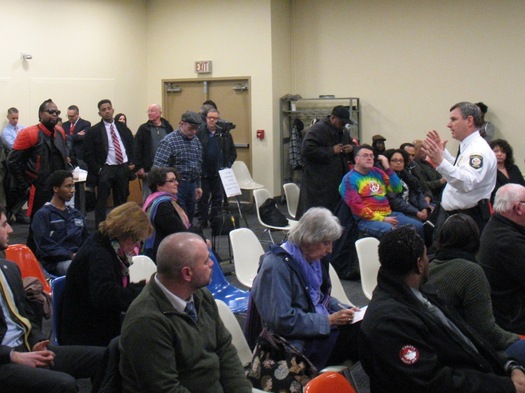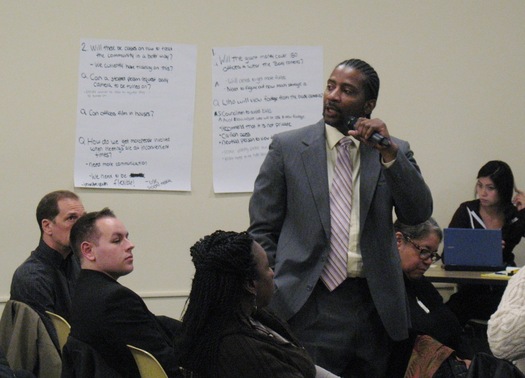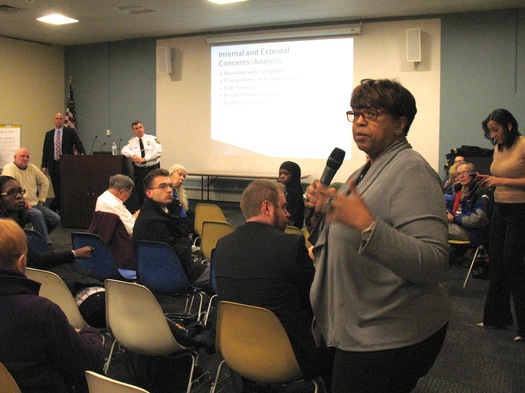Thinking about police body cameras in Albany

Albany police chief Brendan Cox addressing the crowd at the start of the forum.
The Albany Police Department is planning to pilot test officer body cameras this summer, with an eye toward eventually expanding the program to the whole department. And the APD is facing a range of questions as it works out the details: When should the cameras be on? What should they capture? Who should get to see the video?
Those were some of the questions discussed at a public meeting to gather input about the topic this past Tuesday at the Albany Public Library main branch. As Albany police chief Brendan Cox told the media beforehand:
"[Body cameras] can seem very simplistic until you start getting into the nitty gritty and recognize that you're dealing with human beings, you're dealing many times with human beings in crisis, but then you're also dealing with human beings in just regular interactions. So you want to try to get it right. Because you don't want to set up false expectations, you don't want to hurt anybody, you don't want to cause any more trauma. So you really want to try to do your best to set up policies, to set up procedures, and to set up trainings."
The hope is, of course, that officer body cameras will provide more and better information about what happens between the police and the public -- from stuff like complaints about rudeness, all the way up to situations in which a person dies during an interaction with police, such as in the death of Dontay Ivy.
Members of the public at the meeting had a lot of questions about the program. (It sounds like both the police and the public are still sorting through what they think about the idea.) But there were also a lot of suggestions.
Here are four thoughts about the topic...
The basics right now
Albany police chief Brendan Cox said multiple times at the public meeting that the APD is still working through many of the issues related to starting up its body camera program -- including which devices to buy. So there aren't a lot of specific details right now. But here's the outline:
+ The Albany police department is currently planning a pilot test of officer-worn body cameras for this summer.
+ If the test runs successfully, the department will move to roll out the cameras in stages -- about 25 officers at a time. The idea is take the implementation slowly in order to catch and address problems as they crop up.
+ The program is being funded in part by a $133,305 grant from the federal government. The city has to provide a 50/50 in-kind or cash match. And it's likely the APD will be seeking additional money for things like storage capacity for the video, which Cox said is responsible for much of the cost associated with the technology. He said the individual body camera units are about $400 each.
On to those thoughts...
Video shows what happened -- or, at least, a version of what happened

Albany police chief Brendan Cox responding to a comment during Tuesday's forum.
The obvious appeal of body cameras for officers is that they produce a record of what happened that's not based on how people remember the situation. And that's helpful, because as Cox pointed out in comments to the media, our memories for the specifics of what happened (or didn't happen) aren't always so great:
"Sometimes it's a he said/she said kind of thing where you can't prove one way or the other. You have the complainant, you have the officer, and you don't have an independent witness. So you're really left with each side giving their side. And really, if you think about it, we could leave here two minutes from now and without turning on our cameras and audio tapes and try to recall everything that was said here and we'd probably all get it wrong. I'm sure I could leave here and say, "I said this." And somebody could turn around and say, "You didn't say that at all."
So to be able to have that on video and on audio, and to be able to play that back for both the officer and the complainant and go, well, here's what actually happened and to be able to correct that on either end. Or to be able to bring those two people together and say, hey, here's what happened on the interaction. There was a misunderstanding, but we can actually correct that misunderstanding.
Talk about being able to increase our legitimacy and talk about procedural justice, which is a huge topic for today's policing world -- to make sure we're treating people in a fair and just manner, that we're giving people a voice, and that we're showing folks that we're being transparent, that we're showing people what we do. These cameras, they're going to help us do that."
That best case scenario -- where video helps clear up exactly what happened or didn't -- will hold true in some situations. And it will be a big help.
But talk to pretty much anyone who creates media and they'll tell you there's a level of subjectivity to recordings that might otherwise seem objective. Where a camera is pointed, and the perspective from which it's recording, can affect how the viewer perceives things. And there's a certain power in being the person who's recording, rather than the person being (primarily) recorded.
During the public comment period Tuesday night, a woman in the crowd made a point in this vein, noting that body cameras face outward from officers. The camera sees other people, but it doesn't see the officer or his/her face. So there's always going to be a limitation in its perspective.
Editing can also introduce all sorts of manipulations. (Reality TV wouldn't exist if editing couldn't shape a series of mundane events into something with drama.) And even if there's a policy that video won't be edited, the act of turning the camera on or off can result in a similar effect.

Albany Common Council member Mark Robinson, who represents the 5th ward, which includes parts of West Hill and Arbor Hill.
That question of when the cameras should be recording is one of the key issues Albany police will have to sort out. And it came up multiple times during Tuesday's meeting, with people suggesting all sorts of times when the cameras should be on -- at the start of any interaction with the public, when officers get of our their cars, one person even suggested the cameras start recording at the beginning of each shift. Common Council member Mark Robinson said the cameras should be engaged any time officers respond in a community of color. And at least one person said members of the public should have the right to request an officer turn on his/her body camera.
Privacy is a concern, but maybe not as much as expected
To some extent a body camera is going to see what an officer sees. And that means capturing all sorts of situations, viewpoints, and details that up to now have usually gone unrecorded -- people in extreme physical or emotional distress, the gory details of a crime scene, or even just people who happened to be at the scene and weren't directly involved.
"A body camera is on the individual officer, so it's capturing all of that personal contact that the citizen and officer are having," Brendan Cox told the crowd Tuesday. "It's a completely different level of privacy, a level of privacy that none of those other cameras [such as patrol car dash cams] could ever touch."
So the issue of privacy is going to be important and potentially difficult to navigate. To which side should the program err: capturing more of what happened, even if that means recording people in their most exposed and comprised moments -- or leaning more to the side of privacy, even if that means missing some things? How should the privacy of people depicted in videos -- either those directly involved or bystanders -- be treated if/when the videos are made public? And to what extent are the videos a personnel record that provide some level of privacy to officers?
Based on the comments made by members of the public during Tuesday meeting, we got the feeling people there were leaning towards being in favor of the cameras capturing more rather than less. For example: a few people said they believed the cameras should always be on whenever officers enter a private home -- that the need for a record and accountability outweighed concerns about privacy in that situation.
Who gets to review the video?
That issue of police accountability -- and how body cameras potentially aid that goal -- frequently came up in public comments. Multiple people called for some sort of independent review of the video. As one man said in his comment: "You can't gain the community's trust if the police are still policing the police. You'll never, never get the community's trust in that way."
So, who gets to see the video? And who gets to decide if there's a potential problem?
There were a couple of different solutions offered at the meeting. Bernard Bryan, president of the Albany branch of the NAACP, called for some sort of ombudsman -- a person who's not a member of the police department -- who would have no-questions-asked access to the video and then would report directly to the Common Council.

Albany Common Council president Carolyn McLaughlin
And Common Council president Carolyn McLaughlin said after the meeting that there needs to be some sort of independent review:
"I do think that there should be people who represent a cross-section of the community. I would say people who have a need-to-know basis. Someone from the community that may be a well-respected individual, maybe who represents an organization. Maybe the NAACP. Maybe one of the ministers, someone from the clergy. ... I do know that the police department has to have a role in that as well, just to make sure it's a transparent process. But there has to be someone from the community involved in that process."
It'll be important to see how this angle gets worked out -- and who gets to pick the people who review the video.
This is about forming rules and guidelines for the future
Body cameras are a relatively new tool for police departments. Many cities are just starting to get experience with the tech. And it's probably fair to say the cameras are closer to the start of an era rather than its end.
Predicting the future is always tricky (or foolish), but it's not hard to see potential futures in which systems of recording and surveillance become more pervasive. Maybe a decade from now every officer has a tiny personal drone that follows her around recording the whole scene. Or maybe the images from body cameras are plugged into a wider system that mashes together fixed surveillance cameras, facial recognition, and license plate readers to create detailed maps -- both geographic and social -- of people's whereabouts and relationships. All those potential developments will include all sorts of hard questions about what's right and what should be allowed.
So it's worth thinking about the rules and practices for officer body camera use in terms of a community's general values and goals for accountability, privacy, and justice. The tech is a tool, and it will always prompt some difficult questions, regardless of what form it takes. But those questions will be even harder to answer if there's not some overall sense of where we all want to go.
+ An org called the Police Executive Research Forum has put together a report looking at the experiences of police departments with body cameras, and offering some recommendations based on what it found. Albany police chief Brendan Cox said Tuesday that the APD has been drawing on that report as it sorts through the issues here.
+ The think tank Data & Society published thought-provoking primer on police body cameras. If you'd like a quick-read version, a few of the authors wrote an article -- "It's Not Too Late to Get Body Cameras Right" -- for The Atlantic.
... said KGB about Drawing: What's something that brought you joy this year?